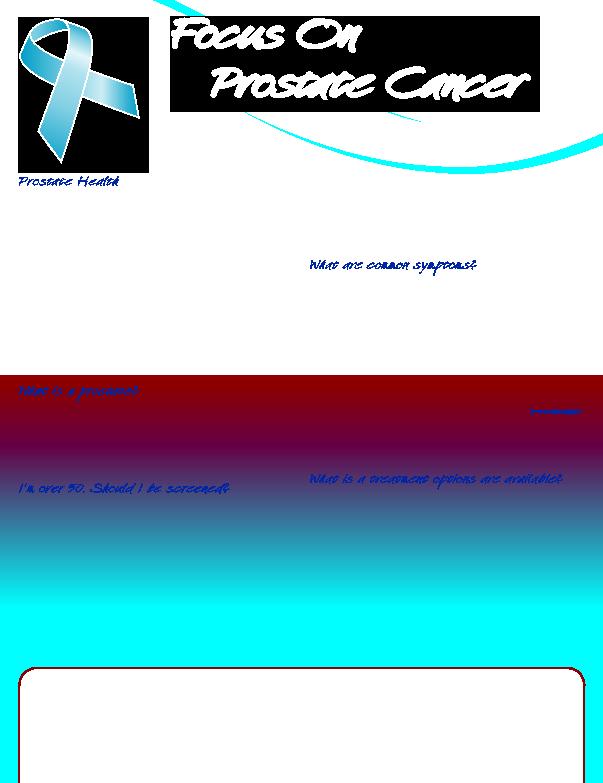
Focus On
Prostate Cancer
Prostate Health
Did you know it's estimated 239,000 men in America will
be diagnosed with prostate cancer this year? Another
staggering estimate is, nearly 30,000 deaths will be
attributed to this disease. While these are ugly statistics,
there is great hope for men who take an active role in their
health. Of course, prevention is your first line of defence.
Diet and exercise are key when taking a proactive role in
your health. In our library here at the Cancer Center, you
will find a great deal of information on prostate cancer.
Early detection is also very important and can lead to
more treatment options and a better outcome. Screenings
play a significant role in this. See the adjoining page for
details on our next free prostate cancer screening.
What is a prostate?
The prostate is a gland located below the bladder and
in front of the rectum of males and is part of a man's
reproductive system. A healthy prostate is roughly the size
of a walnut. Due to its location, it can be readily assessed
during a digital rectal examination (DRE).
I'm over 50. Should I be screened?
Family history plays a role in this. As men age they have an
increased risk of developing benign prostatic hyperplasia
(BPH) and prostate cancer. BPH causes the prostate to
enlarge, thereby squeezing the urethra, which is surrounded
by the prostate, slowing or stopping the flow of urine.
Prostate cancer is the growth of malignant cells of the
prostate. A Prostate-Specific Antigen (PSA) blood test
and a DRE are often used to screen for prostate cancer.
Annually, we hold free community screenings which
include a PSA blood test and a digital exam (DRE) for
the detection of prostate cancer. Our recommendation
for men is to have a discussion with their physician
regarding prostate cancer screening starting at age 50 (or
younger with a significant family history).
What are common symptoms?
· Weak or interrupted ("stop-and-go") flow of urine
· Sudden urge to urinate
· Frequent urination (especially at night)
· Trouble starting the flow of urine
· Trouble emptying the bladder completely
· Pain or burning while urinating
· Blood in the urine or semen
· Chronic pain in the back, hips, or pelvis
· Shortness of breath, feeling very tired, fast heartbeat,
dizziness, or pale skin caused by anemia
(www.cancer.gov)
Be sure to speak with your physician should you have
any of these symptoms. Please note that these symptoms
could be caused by conditions other than prostate cancer.
What is a treatment options are available?
The Tri-Cities Cancer Center offers several radiation
treatment options for men diagnosed with prostate
cancer. Other options, aside from radiation therapy,
include: active surveillance, surgery, chemotherapy,
hormone therapy and immunotherapy. Several factors
including age, general health and grade of the tumor will
dictate what the appropriate form(s) of treatment will be.
Some men will have a combination of treatment options.
Be sure to talk with your physician regarding steps you
can take to be proactive about your health, including
prostate specific suggestions.
Pain Series: Meditation and Breathing
Tuesday, September 24th from 1:00 p.m. to 2:00 p.m.
Facilitator: Tracy Hancock
Conscious breathing and meditation have long been proven to regulate stress to various systems of the body, calm the mind and
create a sense of peace. When your body, mind and spirit are all in harmony with one another, you are better prepared to handle
what life throws at you.
Please RSVP by September 23rd: (509) 737-3427 or online at www.tccancer.org.

